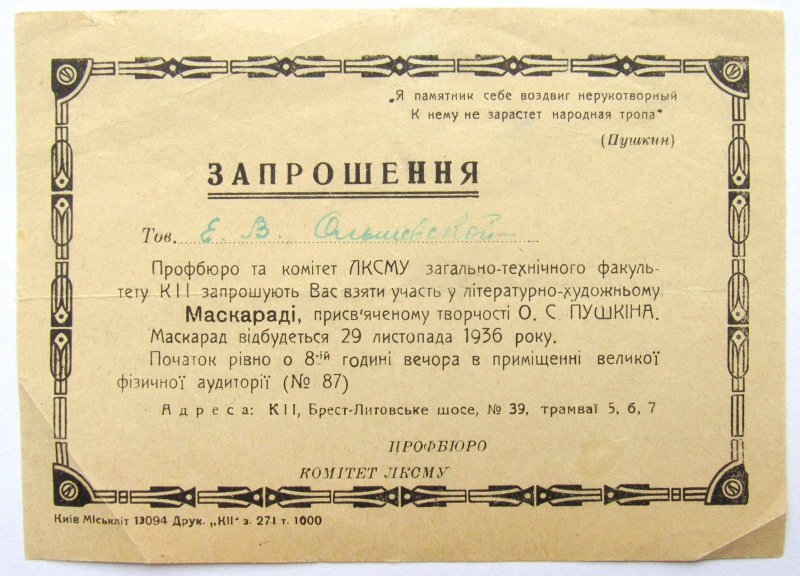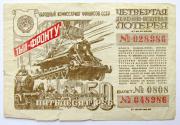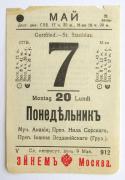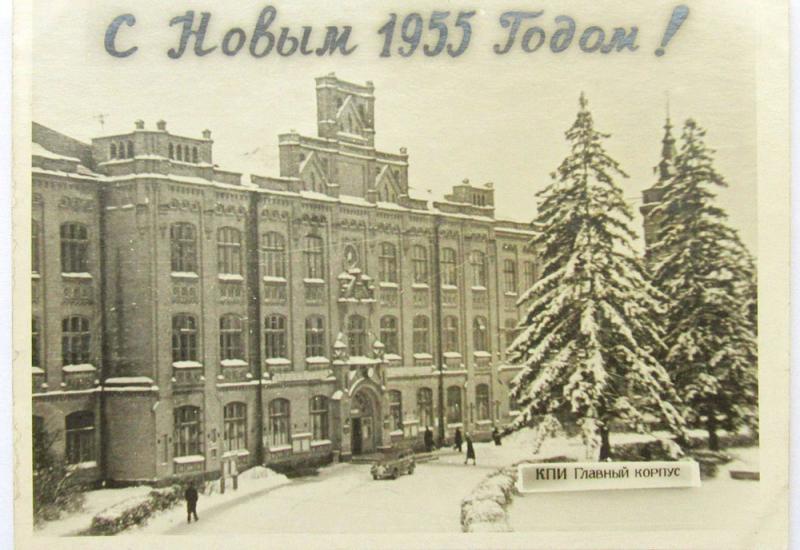Ten years ago, the Department of rare and valuable documents, which fund began to collect old books, was created at G. I. Denysenko Scientific and Technical Library of the National Technical University of Ukraine “Igor Sikorsky Kyiv Polytechnic Institute”. Receiving books, the fund employees review them, describe, and enter them in catalogs. During these searches, the employees sometimes find various papers in old books - sheets of detachable calendars, photographs, photo negatives, documents, personal letters, etc. It seems that these papers were used as bookmarks that readers forgot in books. Some of them are worth naming.
One of the items found is a photo card. The card congratulates on New Year 1955 and shows the first building of the Kyiv Polytechnic Institute. There is also an invitation to a night off: ‘Dear Comrade ___ Dean's Office, Party Bureau, and public organizations of the Mechanical Faculty of the Order of Lenin Kiev Polytechnic Institute invite you to a night off, which will take place in the club hall of the Institute on December 10, 1956, at ___ o'clock. AGENDA: 1. Business matters. 2. Concert”. Please note: the night off begins with the business part. It reminds the famous comedy film “Carnival Night” (“Karnavalnaya noch”), in which the director of the Culture House was going to make a report before the New Year concert. The film was shot in 1956. So the business part of the night off is not a fiction of the screenwriter. Another invitation is to the literary and art masquerade dedicated to Alexander Pushkin, which was to take place on November 29, 1936. Pay attention that the invitations of 1955 and 1956 were written in Russian, while the invitations of 1936 - in Ukrainian.

Quite often, one can find tram tickets in books – from the 1920s, 1930s, and 1950s. The tram line, which ran near the Kiev Polytechnic Institute Park along the Brest-Lytovsk highway (now - Peremohy Avenue), opened in 1899. The oldest of the tickets found date back to the early 20th century. The reverse side of one of them has an advertisement for a store located on Khreshchatyk: “High-quality Kaplan dresses. A wide range of materials from the best companies. Moderate prices.”
And here is a large flyer: “Cough caramel drops Katie Boss made of herbs by B.A Semadeny in Kiev.” The card shows the numerous medals received by these cough drops. The back of the flyer contains its composition and purpose in several languages.
One of the books of the middle of the last century had a one-ruble banknote of 1947.
It was that year when the USSR carried out a monetary reform. The bill looks new. The fact that someone used it as a bookmark is not surprising because worker's wages were measured in hundreds of rubles then.
Another discovery of a financial nature was a ticket to the fourth cash lottery in 1944 with the inscription “Rear Front” (“Tyl-front”). The ticket depicts the legendary T-34 tank. The staff of the Kyiv Institute of Electric Welding under the guidance of Academician E.O. Paton developed the tank armors. The ticket did not win and therefore was used as a bookmark.
Among the finds, there are also admissions to classes. One of them is as follows: “№ 9033 In the spring semester of 1913, a student of the Mechanical Department, Katin Alexei, has the right to start working in the Laboratory of Testing Steam Boilers. On January 16, 1913. Dean - Prof. Erchenko.”
And here is a small yellowed piece of paper with the inscription in pencil: “The course of technical mineral substances was returned by the student Nikishin on Dec. 26, 1918.” Just imagine: a revolution continues in Ukraine, November-December 1918. There is an uprising led by the Directory against Hetman Skoropadsky. On 15 December, the troops of the Directory enter Kyiv. Meanwhile, student Nikishin is studying the technology of minerals, returning the book to the library. The librarian makes a note on a piece of paper, perhaps because the registry book was difficult to find...
There are leaves in books from detachable calendars of different times.
Here is a page from the calendar of the “Ed. Goppe” firm, May 7 (according to the old calendar), Monday, 1912. The paper indicates the date in the new style - May 20, days in German and French. The reverse side of the calendar page gives the poem “Thoughts” (“Dumy”) by poetess Olga Chiumina, and has the inscription below: “Lunch on May 8. // Asparagus soup // Pikeperch Orly // Fried chicken // Cream (Kaimak)”. If you became interested in this menu, Google will tell you the most delicious recipes.
The calendar page for March 27 (in the old style) 1907 has different information. The front side of the publishing house “Donskaia Rech” (Rostov-on-Don) calendar page says: “1883 Strelnikov’s case on 23 in Odessa”. The back of the page gives a short story about the trial, which was prepared by the then famous military prosecutor Strelnikov. He was said to have intimidated the detainees and forced them to sign fabricated charges. Thus, the detachable calendar, published, apparently with the permission of censorship, gave information that discredited the then existing government! It is the result of the revolution that began in 1905 and continued in 1906 when the calendar was published. And here is a calendar page of Soviet times - September 21, most likely in 1956. It shows a picture of a very famous in those years painting by Liudmyla Skubko in “Children's Radio program” (1952). And on the back, there are illustrations of the works of a famous Soviet writer. The readers were supposed to guess what illustrations exactly. ... Three small leaves - and each described its era!
So as each discovery did. It did show its period. The staff of the Department of rare and valuable documents forms a collection “Documents of the social life of Igor Sikorsky Kyiv Polytechnic Institute”. Soon, they will preparear.
 |
 |
 |
 |

